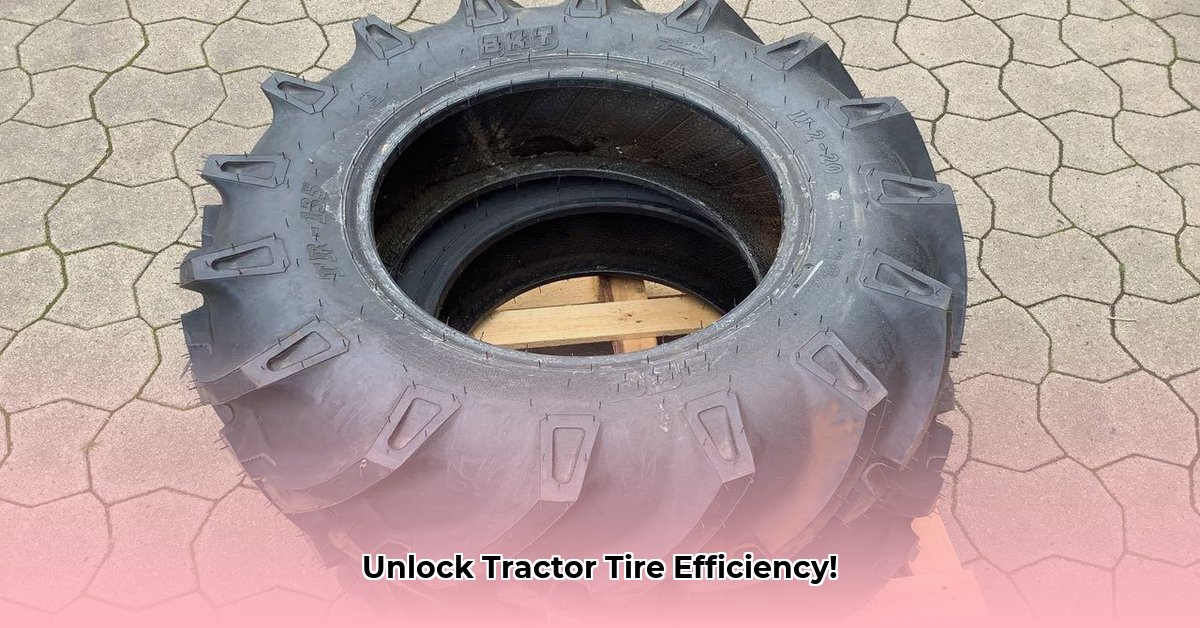
Understanding the BKT TR-135 11.2-20: Specifications and Features
The BKT TR-135 11.2-20 is an 8-ply radial tire designed for agricultural tractors. Its key features include a symmetrical tread pattern and a substantial load capacity of 2469 pounds. The recommended inflation pressure is 35 PSI, though this should be adjusted based on soil conditions and load weight. While precise data on its manufacturing process and materials are currently limited, the robust construction suggests a potentially long lifespan. This information is crucial for assessing its overall cost-effectiveness and environmental impact. For more information on tractor tire tubes, check out this helpful resource: tractor tire tubes.
Performance and Durability: On-the-Field Assessment
While comprehensive independent testing data is currently unavailable, the BKT TR-135's 8-ply construction suggests excellent durability. The symmetrical tread pattern should contribute to even wear, maximizing lifespan and potentially improving fuel efficiency. However, real-world performance will vary depending on factors like soil type, operating conditions, and load weight. Farmer feedback and independent reviews will be essential to fully assess its performance in diverse agricultural settings. Does it outperform comparable tires in terms of traction and longevity? Further research is needed to quantify these claims.
Sustainability Considerations: A Need for Transparency
A critical aspect of any agricultural product is its environmental impact. Unfortunately, readily available data regarding the BKT TR-135's lifecycle assessment (LCA) is currently limited. This lack of transparency makes a complete evaluation of its sustainability challenging. However, we can make some inferences. A longer-lasting tire inherently reduces waste, and a potentially fuel-efficient tread pattern could lower greenhouse gas emissions. Yet, concrete data on material sourcing, manufacturing processes, and end-of-life recyclability is crucial for a complete picture. Full transparency from manufacturers is needed to accurately assess true sustainability. What steps are BKT taking to minimize the environmental footprint of their tire production? This is a question that demands a clear answer.
Cost-Benefit Analysis: Balancing Initial Investment and Long-Term Value
The initial cost of the BKT TR-135 11.2-20 will vary depending on retailer and location. To determine true value, consider its expected lifespan, potential fuel efficiency gains, and minimized maintenance requirements. A longer lifespan translates to fewer replacements, saving both time and money. Even small fuel efficiency improvements can accumulate significant savings over time, particularly on large farms. Regular maintenance reduces the likelihood of costly repairs, further enhancing its overall value proposition. Is the initial investment justified by the long-term cost savings and increased efficiency? This is a key consideration for any farmer.
A Practical Guide to Maximizing Tire Lifespan and Efficiency
This section offers actionable steps for farmers to optimize their BKT TR-135 11.2-20 tires:
Regular Tire Pressure Checks: Use an accurate gauge to check pressure frequently. Adjust pressure according to the load, soil conditions, and weather—lower pressure for softer soils, higher pressure for firmer ground. Consistent pressure management is key and directly impacts fuel efficiency and lifespan.
Frequent Visual Inspections: Regularly examine the tires for cuts, embedded objects, and signs of uneven wear. Addressing minor issues promptly prevents major problems down the road.
Tire Rotation: Rotate your tires according to the manufacturer's recommendation to ensure even wear, extending lifespan and optimizing overall tire performance.
Proper Storage (Off-Season): When not in use, store the tires properly, protecting them from sunlight, moisture, and extreme temperatures.
Engage with Your Supplier: Ask detailed questions about manufacturing processes, material composition, and end-of-life disposal or recycling options. Understand the tire's warranty and the supplier's commitment to sustainable practices.
Key Questions to Ask Your Tire Supplier
- What materials are used in the manufacturing of this tire?
- What is the estimated lifespan under typical farming conditions?
- What are your tire recycling options?
- Are there any independent studies demonstrating the tire's fuel efficiency?
By following these guidelines, farmers can make informed decisions to maximize the performance and efficiency of their BKT TR-135 11.2-20 tires while minimizing their environmental impact. Remember, sustainability is a collaborative effort, requiring both informed choices from consumers and transparent practices from manufacturers. This commitment to responsible purchasing and sustainable practices is vital for the health of both our farms and our planet.